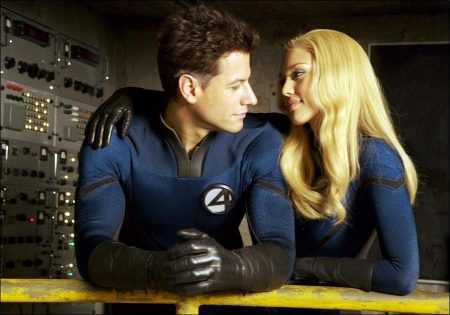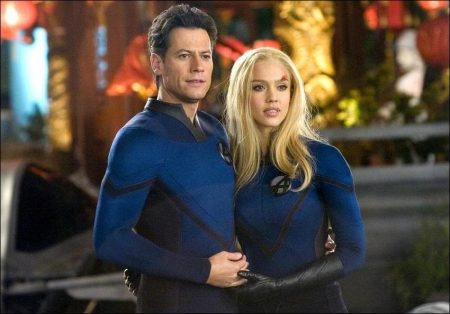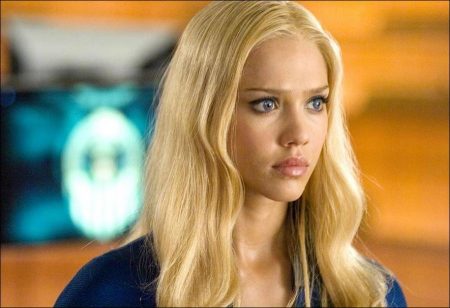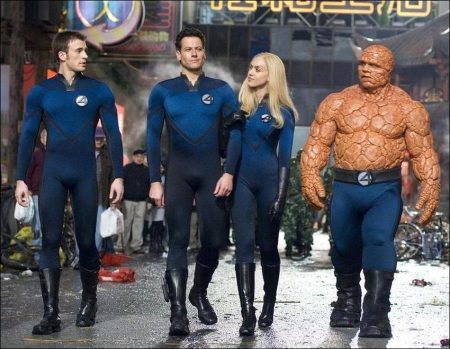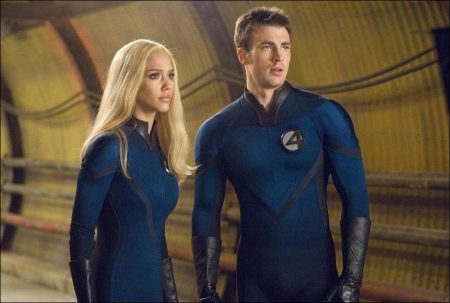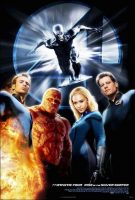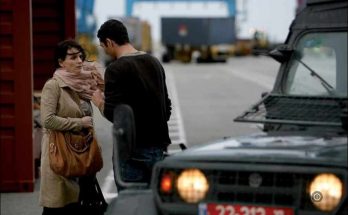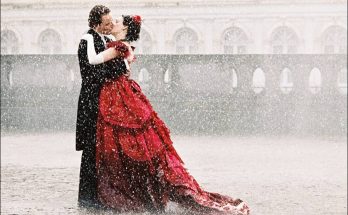Tagline: Rise.
The Fantastic Four meet their greatest challenge yet in Fantastic Four: Rise of the Silver Surfer, as the enigmatic, intergalactic herald, The Silver Surfer, comes to Earth to prepare it for destruction. As he races around the globe wreaking havoc, Reed, Sue, Johnny and Ben must unravel the mystery before all hope is lost.
Fantastic Four: Rise of the Silver Surfer is the second installment of the live-action film series based on what fans around the globe know as “The World’s Greatest Comic Magazine. “Fantastic Four” directed by Tim Story and released in the summer of 2005, had a worldwide theatrical gross of $330 million and became one of Twentieth Century Fox’s most successful DVD titles ever.
For Fantastic Four: Rise of the Silver Surfer, an intriguing element is added to the cast of characters of the 2005 hit – the Silver Surfer. Academy Award winning visual effects house Weta Digital (“The Lord of the Rings,” “King Kong”), working with the film’s visual effects supervisor Scott Squires (a three-time Oscar nominee whose credits include “Star Wars Episode 1 – The Phantom Menace”), created the ultimate computer-generated Silver Surfer, which will be true to the Marvel Comics character beloved by fans worldwide. Weta developed an advanced CG process to bring added dimensionality to the character. Doug Jones provided character and movement references for the digital wizards at Weta.
The Silver Surfer joins the returning family of superheroes from the Marvel Comics universe, including Ioan Gruffudd as Reed Richards, who can stretch and contort his body into any shape he can imagine and, as the group’s leader, is known as Mister Fantastic; Jessica Alba as Sue Storm, who is able to render herself invisible and to create and project powerful force fields as Invisible Woman; Chris Evans as Johnny Storm, known as The Human Torch, who can engulf his body in flames and take flight at will; and Michael Chiklis as Ben Grimm, whose freakish transmutation into a rock-like, superhumanly strong creature led him to be called The Thing. Julian McMahon reprises his “Fantastic Four” role as the Four’s steely-eyed, iron-fisted nemesis, Dr. Doom. Kerry Washington is back as Ben’s love interest, the blind sculptress Alicia Masters.
Recent Emmy-winner Andre Braugher joins the cast as General Hager, a tough Army official who seeks the Four’s help in combating a global menace, and Beau Garrett, who appeared in Fox Atomic’s debut film “Turistas,” plays the general’s aide, Captain Raye. And Oscar-nominee Laurence Fishburne, whose many credits include “The Matrix” and “Mystic River,” voices the Silver Surfer.
“Fantastic Four” helmer Tim Story returns, along with producers Ralph Winter, Avi Arad and Bernd Eichinger. The screenplay is by four-time Emmy winner Don Payne, a co-executive producer on “The Simpsons,” and noted author and screenwriter Mark Frost, who co-scripted “Fantastic Four.”
Academy Award-winning visual effects supervisor Scott Squires, who worked closely with Weta in creating the Silver Surfer, also supervised many of the film’s other state-of-the-art effects, including enhanced powers for the Four; mile-long, perfectlysmooth craters – the handiwork of the Surfer; and the creation of Galactus (also known as The World Destroyer), another character long-known to comics fans as a being of incredible power and scale. “It was a delicate balance meeting the comics fans’ expectations for the look of Galactus, and making him truly spectacular and cinematic to those not familiar with the character,” says Squires.
In 2005, movie audiences worldwide were introduced to the Fantastic Four, the fabulous quartet of superheroes that have captivated comic book readers since their 1961 debut in Marvel Comics’ Fantastic Four #1, created by Marvel legends Stan Lee and Jack Kirby. Headquartered in the world famous Baxter Building in New York City, the Fantastic Four are dedicated to the betterment of the world through scientific discovery and defense against evil. With Fantastic Four: Rise of the Silver Surfer, the filmmakers are able to expand the scope of the first film and introduce new characters, and new adventures, for the world’s premiere superhero team.
Director Tim Story explains: “We’ve got a new character coming to the scene, the Silver Surfer, who is one of the coolest comic book characters of all time. So we’ve upped the ante with bigger stunts, more action, and more CGI characters and situations. With the origin story firmly established, Fantastic Four: Rise of the Silver Surfer screenwriter Don Payne, a lifelong fan of the Fantastic Four comics, set out to take the next step with the series.
“I wanted this movie to be the rare sequel that’s better than the original — with more excitement, more drama, more humor, more action,” Payne says. “I also really wanted to explore where the characters are at this point in their lives. They’re much better off financially, but they’re dealing with the downside of celebrity. Sue and Reed are moving on and trying to get married. Ben and Alicia are enjoying being a happy couple, while Johnny’s got his own issues. So there are exciting things happening with characters and relationships. But most of all, I’m excited about the dimension added by the Silver Surfer.”
Fantastic Four: Rise of the Silver Surfer draws from an amalgamation of storylines from the Fantastic Four comic books, as well as new story developments and characters. “The movie draws from the first appearance of the Silver Surfer in Fantastic Four #48-50,” says Payne. “But we’re also using story elements from Fantastic Four #57-60, where the Silver Surfer encounters Dr. Doom. There are a couple of moments inspired by the recent Ultimate Extinction series as well.”
The film’s main centerpiece from which the story unfolds is the sensational “Wedding of the Century.” Familiar to generations of comic book fans, the wedding between Reed Richards and Sue Storm, first depicted in Fantastic Four King Size Annual #3 in 1965, is the comic world’s equivalent to the historic wedding of Prince Charles and Lady Di. But wedding plans ultimately go awry with the introduction of the Silver Surfer, when mysterious and destructive anomalies start appearing across the Earth and the Fantastic Four are called into action.
The Silver Surfer, the “Sky-Rider of the Spaceways,” made his debut on the pages of Fantastic Four #48 in 1966. Created by Stan Lee and Jack Kirby at the early stages of the 1960s counterculture explosion, the Silver Surfer soon became a mainstay of Marvel Comics, appearing regularly in the pages of the Fantastic Four, and eventually launching his own self-titled series.
The Silver Surfer, whose real name is Norrin Radd, is revered as one of the noblest and most tormented cosmic entities in the Marvel Universe. With his cosmicpowered board, he can absorb and manipulate the universe’s ambient cosmic energies.
“I think the appeal of the Silver Surfer is that he’s a complex, tragic character,” says Don Payne. “He’s got a Zen-like detachment from the world, but he still feels compassion. He’s heroic, having basically sacrificed his own life to serve Galactus in order to save his planet and the woman he loved. However, in doing so, he’s also bringing about the destruction of other worlds and species — so there’s a real moral ambiguity to him. He looks at the world and humanity through an outsider’s perspective, which people find fascinating.”
“We try to stay as close as possible to the Silver Surfer from the pages of the comic book,” Tim Story adds. “Technically, what’s been great about this experience with the Surfer is, because he’s a CGI character, we’re able to create him from scratch, meaning I can sculpt him to look exactly like the comic book character. Our Silver Surfer is the Surfer we all know and love. So I think the fans and everyone who’s familiar with this character will appreciate that he’s going to be living and breathing exactly how they’ve always known him to be.”
“Fantastic Four” saw the apparent demise of the Four’s arch-villain, the tyrant Victor Von Doom, who was encased in a shipping container and exported back to his fictional home country of Latveria. “It’s a fantasy movie so characters can come and go, and die and resurrect,” Ralph Winter explains about Doom’s return. “Doom has figured out how to come back. He’ll be interacting with everyone; still making eyeballs at Sue, still trying to denigrate Reed and thinking that he’s better than Surfer.”
“For the first time Victor and the Fantastic Four must actually work together to achieve a specific goal,” says Tim Story. “At the end of the day we’ll see that you can never trust Victor Von Doom. He always has an ulterior motive.”
The plot and backdrop of FANTASTIC FOUR: RISE OF THE SILVER SURFER also reflect the global scope of the Fantastic Four. Whereas the first film was set entirely in the Fantastic Four’s home base of New York City, the follow-up takes place on the international stage. Screenwriter Don Payne explains: “It’s significant because the Fantastic Four are facing a global threat — not just a threat to themselves or New York, but to the entire world. “We’re painting on a much larger canvas.”
“A lot of the comic book movies that have come out are set in one city, one place,” notes Tim Story. “The whole thing about this series is that the Fantastic Four travels. They’re more explorers and travelers than they are superheroes to a certain extent. They’re going to Shanghai, and all over Europe. It’s just one of the coolest things about this comic book that we fully wanted to take advantage of because I think it will set our movie apart from most.
“It’s always very exciting to revisit a character because you’ve had a chance to play him in the past,” says Welsh actor Ioan Gruffudd about his portrayal of the Fantastic Four’s leader, Reed Richards, widely acknowledged as the smartest man in the world. “I’ve evolved a little bit over the last two years and grown older, so Reed Richards has evolved and has much more confidence and is much more in control. He’s much more of a leader this time. He’s happy in his position as being the leader of the Fantastic Four.”
For Jessica Alba, who reprises her role as Sue Storm, the Invisible Woman, doing this movie was more fulfilling than the first. “In the first film I was trying to figure it out and stay as close to the comic book as possible,” she says. “Now I already know the character so I have a lot more freedom. Ioan, Chris, Chikie (Michael Chiklis) and I have all played these characters before so we’re all really comfortable with them, and it gives us an opportunity to discover new things about each other’s characters and ourselves.”
Chris Evans, who plays Johnny Storm, the Human Torch, was thrilled to return to the character with much more knowledge about what makes him tick. “It’s a real treat as an actor, because you feel like you’ve not only spent some time in the guy’s skin, but you’ve been lucky enough to see what works and what translated,” Evans relates.
While Johnny is the adventurous daredevil and biggest showoff of the team, the filmmakers decided to imbue his character with a little romance in this film. “They want Johnny to be a bit more ready for romance this time,” Evans says. “Because of Reed and Sue’s wedding, and Ben and Alicia’s relationship, it’s a nice story arc for Johnny to all of a sudden feel lonely. Though he discovers it’s more about realizing that the people in your life that you are lucky enough to love and be loved in return are truly valuable and shouldn’t be taken for granted.”
Michael Chiklis, an Emmy and Golden Globe winner for his work on the series “The Shield,” returns as Ben Grimm, The Thing, whose body was transformed into orange-colored rock by the cosmic bombardment in the first film’s origin story. Chiklis says that his character is still a curmudgeon this time around. “I think anybody living in that skin would be a little cranky,” he says. “But I guess that he’s over the initial shock and has moved on to a degree. Now he’s into the day-to-day business of helping save the world.”
The spirit of relationships pervades the Fantastic Four in this film, and that even goes for a giant man made of rock. Ben Grimm continues his relationship with the blind sculptress Alicia Masters, played by Kerry Washington, which began in the first “Fantastic Four.” “I look at Ben Grimm as really the heart and soul of the Fantastic Four,” says Chiklis. “He’s the strongest, but he’s a gentle giant. And he gets really all mushy inside. And the idea of him having a love interest with Alicia actually makes the role much more satisfying. He’s not just sort of a grumpy curmudgeon who’s a one-line joke all the time. He has a heart and a soul and it’s the thing that makes you love The Thing.”
Julian McMahon, currently starring on the FX series “Nip/Tuck,” reprises his role as the Fantastic Four’s archrival, Victor Von Doom, aka Dr. Doom. Initially an ally and benefactor to the Fantastic Four, due to his evil pursuit of power and world domination, he ultimately becomes their chief adversary.
At the end of the first “Fantastic Four,” Dr. Doom was encased, locked away and shipped off to his home country of Latveria. “He sat in a tomb for a long time and he’s pretty upset,” McMahon prefaces about Doom’s inevitable return. “He’s a little bitter and determined to get back at the Fantastic Four, which is what he sets about doing at the beginning of the movie.”
Reprising her role of Alicia Masters from the first “Fantastic Four” is Kerry Washington, who recently co-starred with Forest Whitaker in the acclaimed film “The Last King of Scotland.” Alicia Masters is a blind sculptor whose handicap allows her to see Ben Grimm for the man he is inside, not the hulking rock creature the rest of the world sees. “Alicia is very intuitive and insightful, and has wisdom beyond her years because of the blindness and how it’s affected her life,” Washington explains.
A new addition to the ensemble is recent Emmy winner, Andre Braugher, who plays General Hager, a no-nonsense career soldier who is the U.S. government’s point man on investigating and capturing the Silver Surfer.
Braugher, a longtime fan of the Fantastic Four comics, was pleased to join their world onscreen. “I remember very clearly when the first Fantastic Four comic book came out, and the introduction of all these characters, as well as the Silver Surfer and Galactus. So it’s really rewarding to be in this film. The chance to jump out of a helicopter, the tank work, and the rocket launchings are all a lot of fun. I think if you’re going to be in a comic book movie you ought to do some fun stuff.”
Marvel Comics legend and creator of the Fantastic Four, Stan Lee, makes a now customary appearance in Fantastic Four: Rise of the Silver Surfer during Reed & Sue’s “Wedding of the Century.” In an homage to the final frame from Fantastic Four Special King Size Annual #3 from 1965, the wedding of Sue and Reed issue, Lee appears as himself as a party crasher to the wedding. However, he’s not on the list and is asked to leave. In the first “Fantastic Four,” Lee had a cameo as the Baxter Building mailman.
With enduring characters and a global scope, the filmmakers hope that both fans and non-fans will embrace the film. “I think the film is relevant in the sense that the Four are dealing with a global threat,” says screenwriter Don Payne. “But the movie is really dealing with timeless issues of family and sacrifice. It takes a noble individual to stand up and make sacrifices for the good of humanity. There’s also more action, more excitement, more focus on the characters’ relationships. You want to keep it familyfriendly, but you never want to dumb it down. It has to be a large-scale adventure, with just the right mix of action, drama, humor, and amazing visual effects.
According to producer Ralph Winter, accessibility is the key to the Fantastic Four’s endurance and popularity with worldwide fans. “They’re a little lighter in tone,” he says. “You can see the sort of natural connection and squabbling that happens in a family. They have real-world problems like we do. They can’t hide their powers, the way mutants in X-Men movies can hide or change. These guys don’t; they’re right out there. It makes it a little more fun for everyone.”
The Silver Surfer
Created by writer Stan Lee and artist/co-writer Jack Kirby, the Silver Surfer first appeared in the comic book The Fantastic Four #48 (March 1966). The Silver Surfer is a space-faring adventurer and explorer who roams the cosmos on his cosmic-powered board as the herald for Galactus, the devourer of worlds, searching for new planets for Galactus to consume.
According to Marvel Comics official history, the Silver Surfer wields ‘the power cosmic,’ absorbing and manipulating the universe’s ambient cosmic energies. He can augment his strength to incalculable levels, and is almost totally indestructible. He can navigate space, hyperspace and dimensional barriers, and can fly at near-limitless speeds on his board, entering hyperspace when he exceeds light speed. He has even proven capable of time travel on occasion. The Surfer does not require food, drink, air or sleep. He’s sustained entirely by converting matter into energy. He is immune to temperature extremes and most radiation, and can survive in vacuum environments such as outer space and hyperspace.”
The Surfer’s board, his source of power, is composed of the same impervious, cosmic-powered silvery material as its master’s skin and is mentally linked to the Surfer; it moves in response to his thoughts, even when he is not in physical contact with it. The board is almost totally indestructible, but on those rare occasions where it has been damaged or destroyed, the Surfer has been able to repair or even re-create it.”
Actor Doug Jones, who recently earned acclaim for his portrayal of the mysterious villain the Pale Man in director Guillermo del Toro’s Oscar nominated “Pan’s Labyrinth,” was brought in to provide the Silver Surfer’s character and movement references for the digital wizards at Weta. Laurence Fishburne provides the voice of the Silver Surfer.
For several weeks before production, and during production itself, Jones, a trained mime and contortionist, and his stunt double, Dorian Kingi, worked closely with movement coach Terry Notary on a variety of specially designed camera rigs and harnesses to create the surfing-inspired movements of the Silver Surfer.
Notary, who got his start as a gymnast and circus performer (he was in the original cast of Cirque de Soleil’s “Mystere”), before branching out to movie work. He assisted Doug Jones in recreating many of the Silver Surfer’s movements and iconic positions.
While the Silver Surfer interacts at times with all of the Fantastic Four, he has the closest relationship with Sue, who is the first one to discover that he may not be the planet-destroying villain he’s first made out to be. “The Silver Surfer is just this amazing physical specimen,” Alba says. “He’s not only this silver, sinewy, muscle-y guy, but he’s also innocent. He’s very interesting because he’s so misunderstood, and I love that my character has a connection with him, because she’s maternal and has great feminine instincts. The boys are so raw and they’re ready to fight and pass judgment when they feel something is threatening the universe, whereas Sue tries to look past the situation and see something beyond the obvious. I think that’s something that’s really cool about this movie and for my character.”
“The Silver Surfer is the one thing I can’t wait to see in the film,” Michael Chiklis enthuses. “It’s a great character, an old beloved Marvel character, and the look of him in this film is incredible.”
“The Silver Surfer is just an incredibly sexy character. I think I’m envious of him,” jokes Ioan Gruffudd. “The name in itself is just particularly cool. And visually it’s going to be very exciting to see this character on film.”
The Fantasticar
As important as the Baxter Building is to the Fantastic Four’s mythology, so is the Fantasticar, the flying transport vehicle that originally debuted on the pages of Fantastic Four #3 in 1962, where it earned the nickname “the flying bathtub.” However, as technology has changed, the Fantasticar, too, has evolved through many different versions in the past 40+ years up to its current sleek and streamlined design.
The Fantasticar makes its feature film debut in Fantastic Four: Rise of the Silver Surfer. After Reed Richards unveils this latest invention to the rest of the team in his high-tech Baxter Building lab, they ultimately employ it in their global quest to prevent the destruction of the Earth by Galactus. It becomes a key element in a battle in the sky involving the Fantastic Four, Silver Surfer, Doom and Galactus.
The film’s Fantasticar was designed by noted concept artist/illustrator/vehicle designer Tim Flattery (whose many credits include “Mission: Impossible III,” “Pirates of the Caribbean: Dead Man’s Chest” and the upcoming “Transformers”), in collaboration with Trevor Creed at the Chrysler Group’s design offices, Fantastic Four: Rise of the Silver Surfer director Tim Story and the film’s production designer, Kirk Petruccelli.
Fitting the Fantastic Four’s unique needs, the Fantasticar is a 20-foot long, 12-feet wide, hybrid, vertical take-off/landing craft combining electric-powered fan lift and jet turbine thrust that yields maximum fuel efficiency. Designed by Reed Richards and constructed out of a variety of high-temp composites, and employing early computeraided manufacturing techniques, the vehicle is highly unorthodox, but air-worthy. The Fantasticar’s maximum level flight airspeed is 550 miles per hour with all four members of the Fantastic Four on board. The maximum altitude is 30,000 feet. The Fantasticar is capable of breaking away into three separate vehicles, each powered and maneuverable on its own, with deployable and articulating wings. Each section can maintain the speed and performance of the whole craft.
While most of the work with the Fantasticar was shot on a green screen stage in Vancouver, the vehicle itself was placed on a highly maneuverable platform and with the fans blowing and the car rocking and pivoting it provided a very real flying scenario for the actors.
“The Fantasticar is amazing,” Jessica Alba enthuses. “They took this car to such a new level – it really looks futuristic and totally cool. A highlight for me is definitely going to be to see all those scenes put together.”
About the Production
With the script and cast in place, the producers set up the production offices at Vancouver Film Studios just east of downtown Vancouver. Many of the filmmakers who were part of the first “Fantastic Four” and the “X-Men” films, all Vancouver-based, returned to lend their respective talents to the mammoth production of Fantastic Four: Rise of the Silver Surfer.
To capture many of the world’s iconic monuments and attractions, a second unit crew traveled all over to shoot exterior establishing shots, in cities such as London, New York and Shanghai.
Assistant director and co-producer Lee Cleary, who has worked on all the “XMen” films and the first “Fantastic Four” explains the pre-production process: “The key to prepping a film is locations,” he says. “In this particular movie we’re covering several continents. We’re in New York, Shanghai, Tokyo and London, among others. And when you have one central geographic location like Vancouver that has to represent so many different countries and continents, it requires extensive location scouts.”
The exterior of the Baxter Building was once again filmed at the Marine Building, Vancouver’s – and one of the world’s – finest examples of art deco architecture, located near the waterfront in the center of downtown Vancouver’s financial core.
The rooftop of the Metro Parkade, a seven-level parking structure in downtown Vancouver, was the site of “The Wedding of the Century,” between Reed Richards and Sue Storm. True to its comic book roots, this long-awaited ceremony goes awry with the appearance of the Silver Surfer. Johnny’s pursuit of the Surfer leads to some of the film’s most memorable action sequences.
For one week of filming, the cast and crew relocated to the Lower Seymour Conservation Reserve in North Vancouver, which serves as the Black Forest where the Fantastic Four seek out and encounter the Silver Surfer with the use of Reed’s sensors. The 5,668-hectare reserve contains spectacular and diverse landscapes, replete with alpine meadows, forested slopes, and river flood plains, which provided the Fantastic Four: Rise of the Silver Surfer filmmakers with a dynamic backdrop for the Black Forest sequences.
In addition to weeks of location filming, weeks of stage work were completed at both Vancouver Film Studios and at nearby Mammoth Studios in the suburb of Burnaby, at the same facilities utilized for “Fantastic Four,” “X2” and “X-Men: The Last Stand.”
At Mammoth Studios, an appropriately named warehouse-sized studio in Burnaby, production designer Kirk Petruccelli and his talented team of art directors, set decorators, set designers, and related crew designed and erected Reed Richard’s hi-tech lab, as well as the interior of an Arctic military base where the Silver Surfer is contained. Reed’s lab, built at Mammoth’s Stage 1, is a 6,100 square foot set comprised of numerous spaces for the brilliant scientist to conduct his work, including a Cosmic Sensor Room, Life Sciences, Rocket Science, Supercomputer room, the Fantasticar room, conference room, and the grand circular control panel room complete with a 48-foot by 12-foot HD LCD screen.
Fantastic Four: Rise of the Silver Surfer’s second unit crew filmed for over 40 days, on both various locations and lots of green screen work. The unit handled much of the Silver Surfer/Johnny Storm chase sequences. For the flying chase sequence, additional filming took place all over the world, from Washington DC’s iconic monuments, to the New York’s city skyline and Holland Tunnel, to London and China.
In the two years since The Thing’s last film appearance in 2005’s “Fantastic Four,” Spectral Motion Inc., a leading creature effects shop based in Glendale, California, and owned by award-winning effects artist Mike Elizalde, has made significant improvements and changes in the look and technology of The Thing’s prosthetics and costume, worn by actor Michael Chiklis.
For on-set key prosthetics artist Bart Mixon, who worked closely with Chiklis on the first film, the daily process of applying The Thing’s headpiece and body suit was streamlined to ninety minutes in the second film, far less time than on the first film. The Thing’s headpiece now features a larger brow – something requested by diehard Fantastic Four fans – and more rock appliances and articulation in the overall costume to add to its believability as a rock creature.
Fantastic Four: The Rise of the Silver Surfer (2007)
Directed by: Tim Story
Starring: Ioan Gruffudd, Jessica Alba, Chris Evans, Michael Chiklis, Julian McMahon, Kerry Washington, Andre Braugher, Gonzalo Menendez, Laurence Fishburne
Screenplay by: Mark Frost
Production Design by: Kirk M. Petruccelli
Cinematography by: Larry Blanford
Costume Design by: Mary E. Vogt
Set Decoration by: Elizabeth Wilcox
Art Direction by: Daniel T. Dorrance, Sandi Tanaka
Lubic by: John Ottman
MPAA Rating: PG for sequences of action violence, some mild language and innuendo.
Distributed by: 20th Century Fox
Release Date: June 15, 2007
Views: 90
